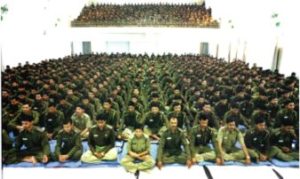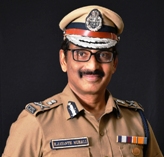CAN SPIRITUALITY BEAR THE CROSS OF THE POLICE?

Filled with action-packed police drama, “Courageous”, made in 2011, is the fourth film produced by Sherwood Pictures. Courageous narrates the saga of four law enforcement officers who bravely confront the worst the streets offer. However, at home, they find they are falling short as Dads, as fatherhood’s challenge is something that they are incapable of grappling with. One of the police officer’s daughters in the film succumbs after being hit by a drunk driver, which forces him to question what is important to him. Following this, the grieving police officer resolves to be a better father. He gets his other three police cronies to agree to promise to abide by a resolution, which includes many things such as spirituality, integrity, and family. All four of them decide to uphold their promise. This endeavour to rectify themselves yields many beneficial transformations in their family-lives and heals past traumas.
Just as the four law enforcement officers in the film Courageous, we’re able to discover meaning and purpose in their lives once they turned to spirituality. Spirituality is essential for all law enforcement officers as it helps them derive meaning and connectedness in life. Spirituality involves recognising a feeling or sense of belief that there exists something more significant than oneself. That there is something more to being human than sensory experience and that the greater whole we are part of is cosmic or divine.
 Most police officers enter the police organisation aspiring to serve, for self-discovery, to find meaning, or a fondness for wearing the uniform. But they soon discover that there is an enormous chasm. Besides, police officers experience an overwhelming discrepancy between their longing and working realities in the field. Soon realisation dawns on them that a policing career is a thankless and unappreciated job about confrontation and crisis management, where police get despised, loathed and hated for no reason.
Most police officers enter the police organisation aspiring to serve, for self-discovery, to find meaning, or a fondness for wearing the uniform. But they soon discover that there is an enormous chasm. Besides, police officers experience an overwhelming discrepancy between their longing and working realities in the field. Soon realisation dawns on them that a policing career is a thankless and unappreciated job about confrontation and crisis management, where police get despised, loathed and hated for no reason.
As I am writing, I hear that a CISF jawan performing election duties in Salem Tamilnadu has attempted suicide by shooting himself. Every day a policeman in some part of the world reaches a point where he believes that his life has no longer any meaning and tragically takes it. When a police officer takes his life, it’s a catastrophe for his family, friends and colleagues.
Such instances happen because a policeman’s job is demanding and threatening. After all, they confront crime, criminals, murder, accidents, suicides, and terrorists day in and day out. All of which takes a massive toll on policemen and their family’s health and wellbeing. Non-recognition of a police officer’s work as valuable and the reality of facing the most wretched and nastiest things in society repeatedly causes distress, desperation, frustration, and even a loss of meaning in a policeman’s life. Police organisations emphasise the police personnel’s physical and mental well-being but ignore their spiritual well-being. There are several valid reasons why police leadership should bestow adequate importance to police personnel’s spiritual well-being.
Sometime back, while I was reading “The Seat of the Soul” by Gary Zukav, I had a lightbulb moment when I came across the concept of authentic power. It occurred to me that most police misconduct in the police organisation stems from misuse and misinterpretation of the powers bestowed on them to carry out their legitimate duties. A police officer’s illegitimate use of power to commit excesses or indulge in torture or sexual harassment of victims emanates from the use of five sensory external power, instead of authentic power. The author defines authentic power as the alignment of the personality with the soul.
 According to Zukav, humanity is transforming from a species pursuing external power, which can manipulate and control using five senses, to a species that grows spiritually by creating authentic power. Authentic power is the capacity to distinguish love from fear within oneself and choose love no matter what is happening inside an individual or what is happening outside him. Creating authentic power consciously requires a person to choose his intentions that result in consequences for which the chooser will assume responsibility.
According to Zukav, humanity is transforming from a species pursuing external power, which can manipulate and control using five senses, to a species that grows spiritually by creating authentic power. Authentic power is the capacity to distinguish love from fear within oneself and choose love no matter what is happening inside an individual or what is happening outside him. Creating authentic power consciously requires a person to choose his intentions that result in consequences for which the chooser will assume responsibility.
Law enforcement officers wield enormous power against the citizens. They deprive them of their freedom, search them and their dwellings, and seize their property and use force against them. Further, because of the rigid hierarchy and rank structure, police officers also exert powers over their subordinates to subdue them or harass them mentally or sexually under the guise of discipline. Introducing police officers to the concept of authentic power during the initial days of training could go a long way in shifting their mindset from the one relying on external power to the one exercising authentic power, inducing them to realise that there is no power in abuse and revenge.
Policing is a highly stressful job that draws on every aspect of an officer that an officer has in his armoury. A grounding in spirituality or spiritual practices can make police officers incredibly resilient and develop in them high levels of self-control, compassion, professionalism, and love for the work they have chosen to do. Spirituality may also help police officers to develop an aptitude to transform negative experiences, swivel their emotionally charged frustrations and reverse the feelings of victimisation to generate new meaning and compassion. Clear proof now appears to be emerging that spiritual practice can help police officers cope with their job’s toxic nature.
Police officers cultivating a spiritual practice even during extreme suffering, violence and tragedy discover immense resources within themselves to counter the bombardments and storms in their outer life by uncovering and staying connected to their spiritual beliefs. Such officers unfailingly display qualities of empathy, ethical honesty and an intense yearning to serve humanity. A study is crucial to investigate spirituality in policing and determine to what degree spiritual resources build police officers’ capability to serve with compassion in their professional arena and to create meaning and purpose in their lives.
Every police organisation’s motto must be to train and equip their men so that they are fully fit to perform their role. The fitness which I am talking about is holistic. The one that encompasses physical, mental and spiritual wellness. All three are essential, though we find neglect of the spiritual dimension in our country. And all police organisations must-have resources to meet police personnel’s spiritual requirements.
Studies have shown that meditation and mindfulness yield positive consequences for the stressed-out policeman. Finding a calm spot and reflecting for a few moments, relinquishing control of whatever is vexatious and tormenting, could calm a police officer down. Spirituality not only brings better health outcomes, but it also enables police officers to cope with disease, suffering, depression and death.
Finally, what sets human beings apart is the ability to transcend the five senses to experience our spiritual dimension. The journey from the physical to the spiritual dimension is the voyage from gross to subtle, finite to infinite and tangible to intangible; it’s a journey, which could awaken the inner spirit and lead to a realisation of the oneness of all.
Source from: epaper/dtnext/chennai/dt:04.04.2021
 Dr.K. Jayanth Murali is an IPS Officer belonging to 1991 batch. He is borne on Tamil Nadu cadre. He lives with his family in Chennai, India. He is currently serving the Government of Tamil Nadu as Additional Director General of Police, Law and Order.
Dr.K. Jayanth Murali is an IPS Officer belonging to 1991 batch. He is borne on Tamil Nadu cadre. He lives with his family in Chennai, India. He is currently serving the Government of Tamil Nadu as Additional Director General of Police, Law and Order.

